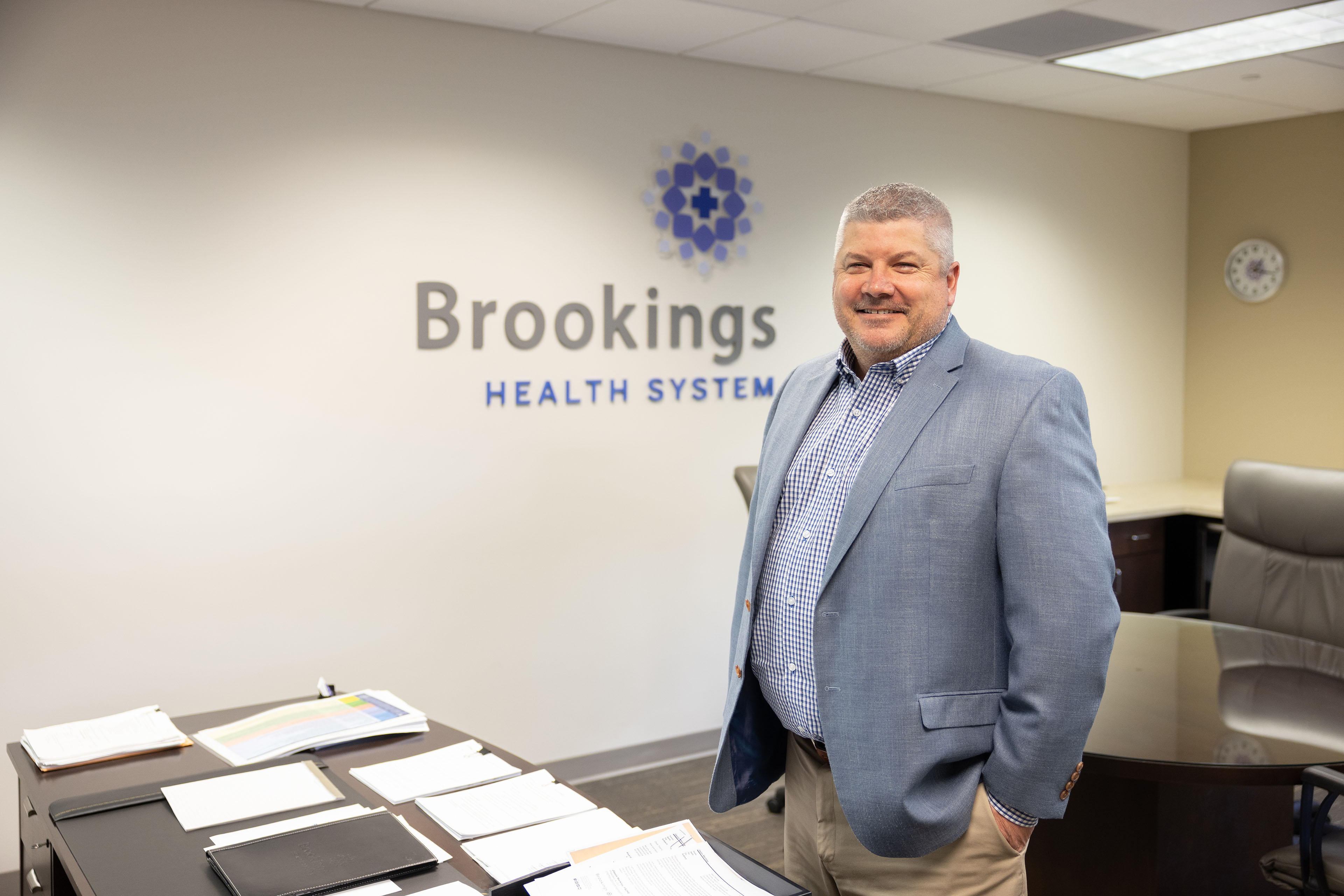Rural hospital leaders are questioning whether or not they can proceed to afford to do enterprise with Medicare Benefit firms, and a few say the one solution to preserve companies and defend sufferers is to finish their contracts with the non-public insurers.
Medicare Benefit plans pay hospitals decrease charges than conventional Medicare, mentioned Jason Merkley, CEO of Brookings Well being System in South Dakota. Merkley apprehensive the losses would spark workers layoffs and cuts to affected person companies. So final 12 months, Brookings Well being dropped all 4 contracts it had with main Medicare Benefit firms.
“I’ve had plenty of discussions with CEOs and govt groups throughout the nation in regard to that,” mentioned Merkley, whose well being system operates a hospital and clinics within the small metropolis of Brookings and surrounding rural areas.
Merkley and different rural hospital operators in recent times have enumerated a protracted checklist of issues in regards to the publicly funded, privately run well being plans. Along with the reimbursement difficulty, their complaints embrace fee delays and a resistance to authorizing affected person care.
However rural hospitals abandoning their Medicare Benefit contracts can go away native sufferers with out close by in-network suppliers or drive them to scramble to change protection.
Medicare is the principle federal medical insurance program for folks 65 or older. Contributors can enroll in conventional, government-run Medicare or in a Medicare Benefit plan run by a non-public insurance coverage firm.
In 2024, 56% of city Medicare recipients have been enrolled in a non-public plan, based on a report by the Medicare Fee Advisory Fee, a federal company that advises Congress. Whereas simply 47% of rural recipients enrolled in a non-public plan, Medicare Benefit has expanded extra shortly in rural areas.
Lately, common Medicare Benefit reimbursements to rural hospitals have been about 90% of what conventional Medicare paid, based on a brand new report from the American Hospital Affiliation. And conventional Medicare already pays hospitals a lot lower than non-public plans, based on a latest research by Rand Corp., a analysis nonprofit.
Carrie Cochran-McClain, chief coverage officer on the Nationwide Rural Well being Affiliation, mentioned Medicare Benefit is especially difficult for small rural amenities designated crucial entry hospitals. Conventional Medicare pays such hospitals additional, however the non-public insurance coverage firms aren’t required to take action.
“The overwhelming majority of our rural hospitals are usually not ready the place they will take additional cuts to fee,” Cochran-McClain mentioned. “There are such a lot of which are simply actually in a precarious monetary spot.”
Almost 200 rural hospitals have ended inpatient companies or shuttered since 2005.
Mehmet Oz — physician, former speak present host, and newly confirmed head of the Facilities for Medicare & Medicaid Companies — has promoted and labored for the non-public Medicare business and known as for “Medicare Benefit for all.” However throughout his latest affirmation listening to, he known as for extra oversight as he acknowledged bipartisan issues in regards to the plans’ value to taxpayers and their impact on sufferers.
Cochran-McClain mentioned some Republican lawmakers need to handle these points whereas supporting Medicare Benefit.
“However I don’t suppose we’ve seen sufficient but to actually know what course that’s all going to take,” she mentioned.
Medicare Benefit plans can supply decrease premiums and out-of-pocket prices for some individuals. Almost all supply additional advantages, comparable to imaginative and prescient, listening to, and dental protection. Many additionally supply perks, comparable to health club memberships, vitamin companies, and allowances for over-the-counter well being provides.
However a latest research within the Well being Companies Analysis journal discovered that rural sufferers on non-public plans struggled to entry and afford care extra typically than rural enrollees on conventional Medicare and concrete individuals in each sorts of plans.
Susan Reilly, a spokesperson for the Higher Medicare Alliance, mentioned a latest report printed by her group, which promotes Medicare Benefit, discovered that non-public plans are extra reasonably priced than conventional Medicare for rural beneficiaries. That evaluation was performed by an outdoor agency and primarily based on a authorities survey of Medicare recipients.
Reilly additionally pointed to a research in The American Journal of Managed Care that discovered the expansion of personal plans in rural areas from 2008-2019 was related to elevated monetary stability for hospitals and a diminished threat of closure.
Merkley mentioned that’s not what he’s seeing on the bottom in rural South Dakota.
He mentioned conventional Medicare reimbursed Brookings Well being System 91 cents for each greenback it spent on care in 2023, whereas Medicare Benefit plans paid 76 cents per greenback spent. He mentioned his workers tried negotiating higher contracts with the large Medicare Benefit firms, to no avail.
Sufferers who stay on non-public plans that now not contract with their native hospitals and clinics might face increased costs except they journey to in-network amenities, which in rural areas may be hours away. Merkley mentioned most sufferers at Brookings Well being switched to conventional Medicare or to regional Medicare Benefit plans that work higher with the hospital system.
However switching from non-public to conventional Medicare may be unaffordable for sufferers.
That’s as a result of in most states, Medigap plans — supplemental plans that assist folks on conventional Medicare cowl out-of-pocket prices — can deny protection or base their costs on sufferers’ medical historical past in the event that they change from a non-public plan.

Some rural well being programs say they now not work with any Medicare Benefit firms. They embrace Nice Plains Well being, which serves components of rural Nebraska, Kansas, and Colorado, and Kimball Well being Companies, which relies in two small cities in Nebraska and Wyoming.
Medicare Benefit plans typically restrict the suppliers sufferers can see and require referrals and prior authorization for sure companies. Requesting referrals, in search of preauthorization, and interesting denials can delay remedy for sufferers whereas including additional work for medical doctors and billing workers.
“The distinctive rural lens on that’s that rural suppliers actually are typically fairly bare-bone outlets,” Cochran-McClain mentioned. “That type of administrative burden pulls folks away from actually with the ability to concentrate on offering high quality care to their beneficiaries.”
Jonathon Inexperienced, CEO of Taylor Well being Care Group in rural Georgia, mentioned his system needed to arrange a staff to deal solely with protection denials, principally from Medicare Benefit firms. He mentioned some plans incessantly decline to authorize funds earlier than therapies, refuse to cowl companies they already accepted, and deny fee for care that shouldn’t want approval.
In these circumstances, Inexperienced mentioned, the businesses argue that the care wasn’t applicable for the affected person.
“We hear that time period consistently — ‘It’s not medically vital,’” he mentioned. “That’s the catchall for all the things.”
Inexperienced mentioned Taylor Well being Care Group has thought of dropping its Medicare Benefit contracts however is conserving them for now.
Cochran-McClain mentioned her group helps coverage modifications, comparable to a federal invoice that goals to streamline prior authorization whereas requiring Medicare Benefit firms to share information in regards to the course of. The 2024 invoice was co-sponsored by greater than half of U.S. senators, however must be reintroduced this 12 months.
Cochran-McClain mentioned rural-health advocates additionally need the federal government to require non-public plans to pay crucial entry hospitals and comparable rural amenities as a lot as they might obtain from conventional Medicare.
Inexperienced and Merkley burdened that they aren’t towards the idea of personal Medicare plans; they only need them to be fairer to rural amenities and sufferers.
Inexperienced mentioned rural and unbiased hospitals don’t have the leverage that city hospitals and huge chains do in negotiations with big Medicare Benefit firms.
“We simply don’t have the flexibility to swing the pendulum sufficient,” he mentioned.


